Protect your workforce and comply with UK legislation through our accredited sharps training course. Our specialist training reduces workplace exposure by 80% and opens doors to higher-paying specialist cleaning roles.
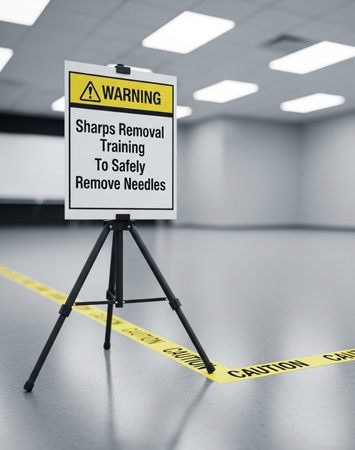


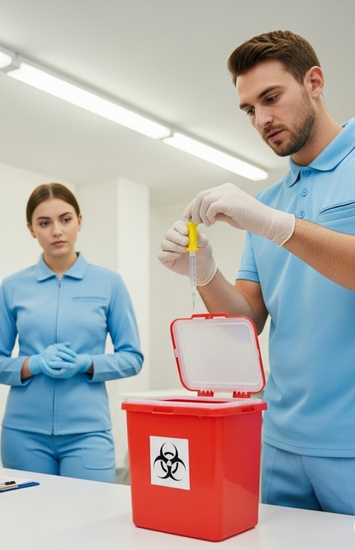
Over 100,000 needlestick injuries occur each year in the UK, with many happening in non-healthcare settings like parks, public toilets, and abandoned properties. A single needlestick injury can cost an employer over £35,000 in liability, yet fewer than 15% of cleaners are trained to deal with sharps safely.
Our comprehensive sharps training courses equip your team with the knowledge and skills needed to safely collect and dispose of needles, sharps and clinical waste while ensuring full compliance with current waste regulations. Whether you need online training or prefer hands-on learning, we provide flexible training course options that fit your business needs.
Used needles can carry over 30 bloodborne viruses, including Hepatitis B, Hepatitis C, and HIV. Hepatitis B can survive for up to 7 days outside the body, making improper handling extremely dangerous. According to local authority surveys, 1 in 3 drug-related discarded needles are found in public spaces, often in areas cleaned by contractors without prior notice.
Without proper sharps awareness training, workers face significant health risks when encountering sharp instruments in their workplace. Our training course addresses these risks posed by improper handling and provides comprehensive safety protocols and answers questions like “what insurance do I need for biohazard cleanup?”.

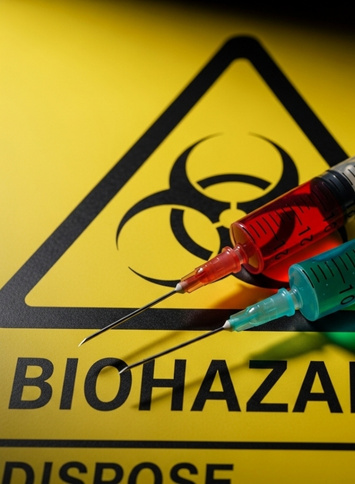
Our accredited sharps training course covers all essential aspects of safe needles and sharps handling, from identification through to safe disposal. The training course is available both online and in-person, allowing learners to complete the programme at their own pace.
This foundational module helps participants understand the importance of sharps removal and needle sweeps. Learners identify common environments where needles and sharps may be encountered, including public spaces and abandoned properties. The module covers health risks associated with improper handling and outlines legal responsibilities under health and safety regulations.
Participants learn to recognise different types of sharps and their specific hazards. The module covers identification of common areas where sharps may be found, including public restrooms, parks, and construction sites. Risk assessment techniques for different environments are thoroughly explained.
This crucial section focuses on the role of personal protective equipment in preventing sharps injury. Learners discover proper selection, use, and disposal of PPE, including gloves, safety boots, puncture-proof containers, and protective clothing. Proper donning and doffing procedures are demonstrated, along with decontamination protocols.
Hands-on techniques for safely handling sharps using correct tools are covered in detail. The module includes step-by-step procedures for conducting needle sweeps, safe handling and lifting techniques, and protocols for dealing with broken or embedded sharps. Use of mechanical aids in dangerous locations is also addressed.
Comprehensive coverage of regulations and methods for proper disposal of sharps. Learners understand legal requirements for sharps disposal, proper use of approved sharps containers, sealing and labelling procedures, safe transportation methods, and disposal at licensed hazardous waste facilities.
Critical response procedures for injuries and incidents involving sharps. The module covers immediate response to needlestick injuries, post-exposure protocols including medical attention and testing, incident documentation requirements, and psychological support options for affected workers.
Safe decontamination procedures following sharps removal are thoroughly explained. Participants learn appropriate use of disinfectants and cleaning materials, prevention of contamination spread, and inspection procedures following cleanup.
Overview of the health and safety legislation governing sharps removal, including COSHH regulations. The module covers ethical responsibilities in sharps removal work and handling sensitive situations in areas with vulnerable populations.
Proper documentation of needle sweeps and sharps removal activities. The module emphasises the importance of accurate record-keeping for compliance, including documentation of sharps found and removed, incident reports, and record retention policies.
Comprehensive review and practical demonstration of proficiency in sharps handling, removal, and disposal. Participants complete both written and practical evaluations to ensure complete understanding of all safety protocols.

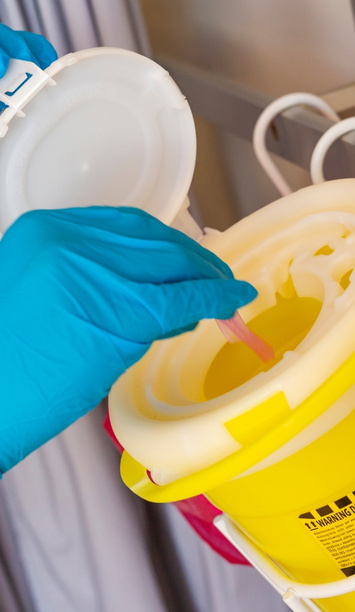
Our e learning platform provides flexible access to all course modules. Learners can progress at their own pace, with course transcripts available for reference. The online training includes interactive elements and can be accessed from any device with internet explorer or modern web browser compatibility.
The online training course includes all essential learning outcomes and provides the same comprehensive coverage as our in-person sessions. Upon completion, participants receive an accredited certificate with completion date and expiry date clearly marked.
For those preferring hands-on learning, our in-person training provides direct interaction with experienced instructors. These sessions include practical demonstrations of sharps equipment and allow for immediate feedback on technique.
In-person training is particularly beneficial for teams who need to sweep buildings or work in high-risk environments. The hands-on approach ensures all employees understand proper procedures for safely collecting sharps and implementing effective waste management protocols.
While primarily designed for non-healthcare settings, our needle sweep training covers healthcare industry applications where additional sharps awareness is required. Healthcare workers benefit from enhanced understanding of sharps collection procedures and safer sharps protocols.
Professional cleaning operatives gain crucial skills for handling drugs paraphernalia and other sharp instruments safely. The training is essential for those working in social housing, public facilities, and specialist cleaning environments.
Prison officers and security personnel often encounter needles and sharps in their work environments. Our training provides essential knowledge for these challenging situations and helps prevent injuries through proper awareness and technique.
Workers who regularly sweep buildings or maintain public spaces need comprehensive sharps awareness training. This includes understanding of waste management protocols and risk assessments for different environments.

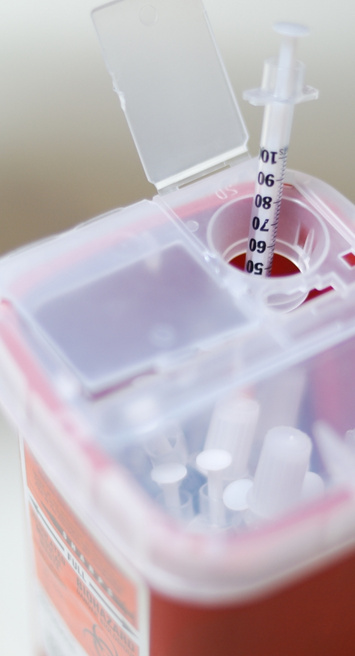
Explore how our students praise the transformative journey provided by Biohazard Cleaning Courses and their pathway to success.

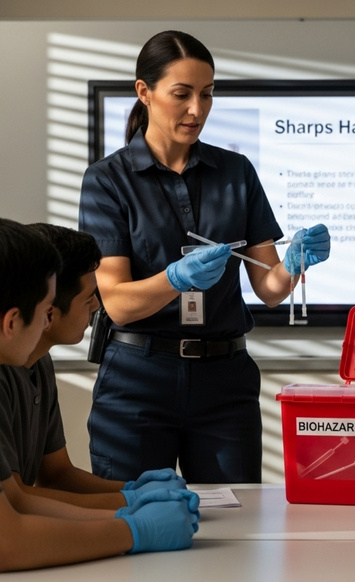
Upon successful completion, participants receive our accredited certificate demonstrating their competency in sharps handling and disposal. The certificate includes details of all modules covered and confirms the individual's ability to safely handle sharp instruments and conduct proper needle sweeps.
Our CPD certification service ensures the training meets current industry standards and legal responsibilities. The certificate provides evidence of compliance with health and safety requirements and demonstrates the holder's commitment to best practice.
Certification delegates receive an hss printable certificate that can be used for employment purposes and contract bidding. The certificate clearly shows completion date and is recognised across the cleaning industry and healthcare sector.
15 years of expertise in biohazard training excellence.
Over 3000 professionals certified. Master the art of specialized cleaning.
Over 1500 satisfied professionals trust our biohazard training.
Thorough, hands-on training solutions for a safer professional environment.
Under COSHH and RIDDOR regulations, employers must ensure workers exposed to biohazards receive proper training. Failure to follow sharps protocol can result in prosecution and substantial fines from the HSE.
Our training covers all legal responsibilities and current waste regulations affecting sharps handling. Participants learn about employee responsibilities and understand the importance of proper documentation and incident reporting.
The course content addresses all relevant health and safety requirements and provides practical guidance on risk assessments for different work environments. This ensures organisations can demonstrate compliance and protect their workforce effectively.

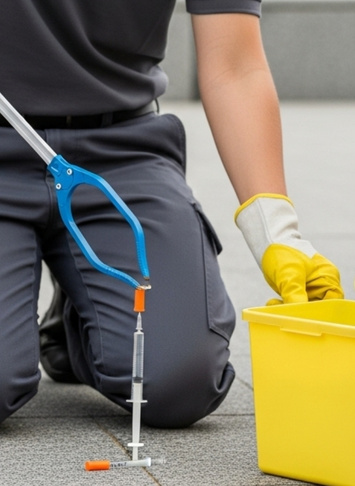

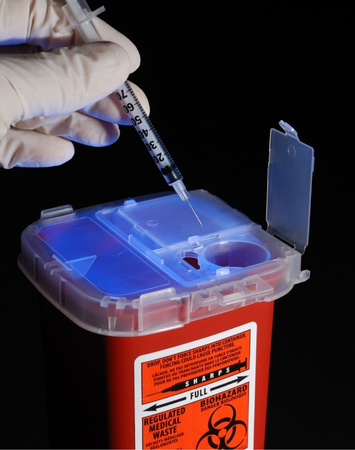
We maintain high standards through regular course content updates and feedback from learners. Our training materials are developed by experts with extensive experience in specialist cleaning and biohazard management.
The course includes comprehensive test questions to ensure knowledge retention and practical application. All materials are designed to prevent injuries through clear instruction and memorable safety protocols.

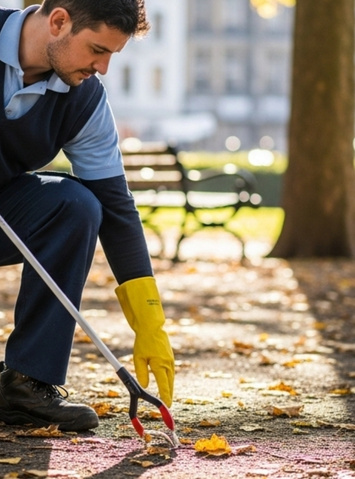
Studies show that workplaces implementing certified sharps training reduce risk of injury by up to 80%. This dramatic improvement in safety outcomes demonstrates the value of proper training and preparation.
Our biohazard cleaning training course opens access to specialist cleaning jobs including biohazard cleaning, trauma scene cleanup, and housing clearance roles. These positions often require proof of sharps awareness and safe disposal training, making our course a key stepping stone to higher-paid specialist work.
Less than 15% of cleaning staff are currently trained in sharps removal, making certified operatives more employable and contract-ready. Emergency services and local councils increasingly rely on subcontractors with proper training for sharps-related callouts.
The cleaning industry continues to evolve, with new challenges and regulations emerging regularly. Our training provides a solid foundation for ongoing professional development and career advancement.
Participants gain skills that are transferable across multiple sectors and can use their certification as evidence of professional competency. The training demonstrates commitment to health and safety excellence and professional standards.
For those seeking advancement in specialist cleaning roles, our sharps training provides essential credentials. Many supervisory and management positions in the cleaning industry require evidence of safety training and risk awareness.



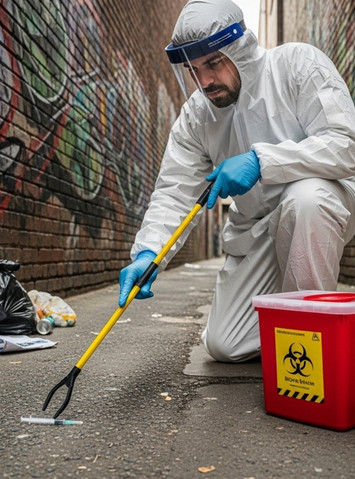
Our e learning platform is designed for ease of use and accessibility. The system works on various devices and operating systems, though we recommend avoiding older browsers like internet explorer for optimal performance.
Course materials are designed with assistive purposes in mind, ensuring accessibility for learners with different needs. The platform includes features to support various learning styles and preferences.
For organisations with multiple learners, we can provide group access and progress tracking. This allows managers to monitor completion rates and ensure all relevant employees receive the necessary training.
Ready to protect your workforce and ensure compliance with sharps handling regulations? Contact Biohazard Cleaning Courses today for your free, no-obligation quote.
Our expert team will assess your specific training needs and recommend the most appropriate course format for your organisation. Whether you need online training for remote workers or hands-on sessions for your entire team, we provide flexible solutions that deliver results.
Don't wait until an incident occurs. Proper sharps training is not just a legal requirement but a critical investment in your workforce's safety and your organisation's reputation.
Contact Biohazard Cleaning Courses now to schedule your sharps training courses and give your team the skills and confidence they need to handle sharps safely and effectively.
Transform your approach to workplace safety with professional training that makes a real difference. Your employees deserve the best protection, and your business needs the peace of mind that comes with proper compliance and risk management.

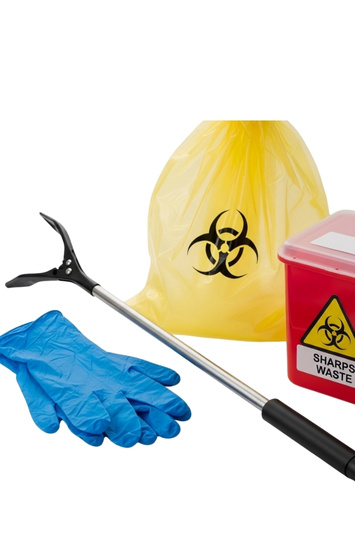
Have questions about biohazard cleaning training? Get expert advice today!